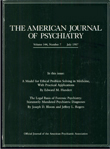Forensic psychiatry and applied clinical ethics: theory and practice
Abstract
The authors briefly describe and then apply a new method--applied clinical ethics--for identifying and working with ethical problems. This method, starting from the clinical context, develops ethical constructs that may be tested in clinical practice and revised if required. The work was done in the context of a combined university- county forensic psychiatric service. The authors discuss three of the identified ethical issues: effects of deinstitutionalization, countertransference with forensic populations, and prediction of dangerousness. They discuss the basis for developing ethical norms from clinical experience and suggest ethical guidelines for medical practice.
Access content
To read the fulltext, please use one of the options below to sign in or purchase access.- Personal login
- Institutional Login
- Sign in via OpenAthens
- Register for access
-
Please login/register if you wish to pair your device and check access availability.
Not a subscriber?
PsychiatryOnline subscription options offer access to the DSM-5 library, books, journals, CME, and patient resources. This all-in-one virtual library provides psychiatrists and mental health professionals with key resources for diagnosis, treatment, research, and professional development.
Need more help? PsychiatryOnline Customer Service may be reached by emailing [email protected] or by calling 800-368-5777 (in the U.S.) or 703-907-7322 (outside the U.S.).



